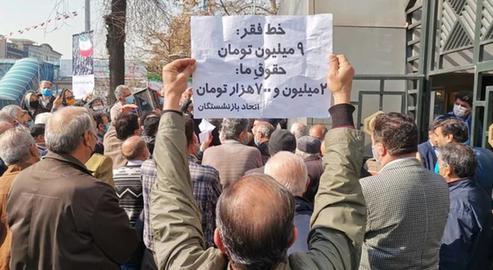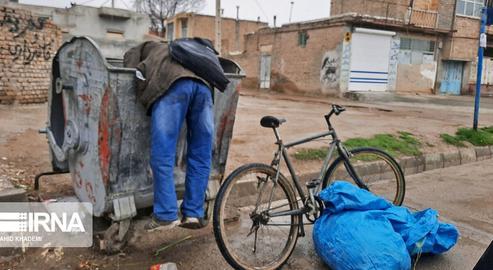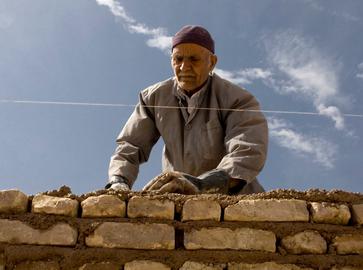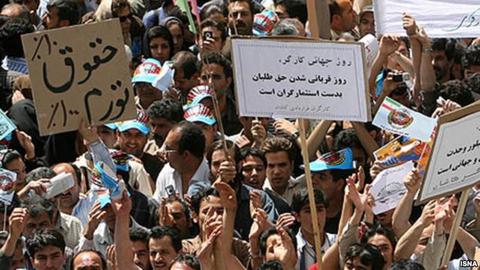The Iranian calendar year 1399 [March 2020 to March 2021] was another difficult year for workers in Iran. The outbreak of coronavirus led to the closure of many factories and manufacturing plants, compounding the problems they already faced.
The pandemic aggravated the pre-existing plight of Iranian workers as they grappled with the government's macro-policies, financial crises in factories, unemployment, the non-payment of wages, insurance and benefits by employers, rampant inflation and scores of other issues. This present report examines the present situation of workers in Iran based on information recently published in Iranian media.
***
Wage Increases are Too Little, Too Late
The last days of March are the customary time when meetings are convened to determine the minimum wage for the following Iranian year. The High Council of Labor, in consultation with the Wages Committee, determines the base salaries and minimum wages for workers after trilateral negotiations with employers’ representatives, the government and workers themselves.
Despite the impact of skyrocketing inflation in 2020-21, the High Council of Labor’s latest meeting to determine wages on March 19, 2020 ended inconclusively after seven hours of debate. A decision has been postponed until the first half of April 2020.
This time last year, the council rubber-stamped the figure of 1,835,427 tomans [about US$80] as the monthly minimum wage for Iranian workers in 2020-2021. Unlike in previous years, the resolution was not signed by labor representatives.
The bill, which was to be sent to the cabinet in order to further determine workers' housing rights, was approved and finalized about three months later. On June 7, 2020, the Council belatedly announced the base salary had been increased to 1.91 million tomans. The minimum salary of single workers without a record of employment was was set at 2.6 million tomans, and the salary of a worker with a child was set at just over 2.8 million tomans.
The minimum and maximum New Year bonus for workers for the year 2020-2021 was initially set at between 3 to 4.5 million tomans. After the base salary was adjusted, the minimum New Year bonus for workers should have been 3,670,000 tomans and the maximum would have been 5,505,000 tomans.
But even these small amounts are often not paid on time. The irregular payment of wages, particularly in manufacturing facilities, have caused serious financial difficulties for many workers and their families. Furthermore the persistently low wages, compared to the significant increase in living costs, have forced many working families to eliminate "entertainment" from their lives, and in some cases healthcare and other amenities. The amount of money workers have at their disposal is decreasing in real terms year on year.
Protests on the Rise
Based on Iranian media reports over the course of 2020-21, workers in Iran, who number around 16 million, have taken part in at least 300 demonstrations since the outbreak of coronavirus. Months of wage arrears, delayed insurance payouts and withheld benefits are evidence of a burgeoning crisis in the manufacturing and service industries. Non-payment of wages in particular can make life impossible for those often working in high-risk jobs.
About 20 out of the 300 recorded protests took place in Tehran. The rallies were spread across most cities in Iran, suggesting that economic and legal issues are affecting the working community across the country.
The Government’s Reward
Based on IranWire’s research, at least 106 court summonses, arrests and executions involving members of the Iranian labor community took place in 2020-21. Two trade unionists alone were condemned to serve at least 381 months in prison, two years in exile and 74 lashes for their efforts to improve the lot of workers.
The previous year, a record 211 arrests, 1,852 months of imprisonment, and 449 lashes were issued to workers and labor activists and their defenders in Iran. Despite the drop in the number of new detainees last year, the final months of 2020-21 have seen an increase in reports of pressure on already-imprisoned workers, as well as deportations and prison ward transfers.
Unemployment and Safety Fears: The Double-Edged Sword of Coronavirus
If before the outbreak of the coronavirus, workers were already becoming unemployed due to company bankruptcies, mass redundancies or the downsizing of factories, the year 2020-21 showed that health concerns could also lead to devastation in a country without effective crisis management protocols in place.
The replacement of fingerprint validation with facial recognition, and the distribution of gloves and disinfectants in factories, were among the measures some employers took to prevent their workers from getting infected. But this did not happen in all sectors. People in public-facing roles such as nurses, bus drivers, department store clerks and bank staff continue to be at risk. In Tehran alone, Majid Farahani, a member of the City Council, has said: "Some 80,000 members of the taxi drivers' organization and more than 100,000 internet taxi firm workers still lack proper masks, gloves and disinfectants."
Labor activists hold the Ministry of Cooperatives, Labor and Social Welfare responsible for inspection and investigation of workplaces during the ongoing pandemic. They have argued the Ministry should be sending inspectors to all sites, canteens and workers’ dormitories to ensure they are being adequately disinfected.
At the same time, many workers in the service industry have been at home ever since late March 2020, as businesses shuttered due to Covid-19 and restrictions on movement. For uninsured workers, coronavirus is a double-edged sword: being active in the job market poses a threat to their health, but so too does staying at home and facing mounting poverty.
In Fars province, the vice president of Shiraz Association of Traditional Restaurants and Canteens has announced the unemployment of about 13,000 people in this union alone, most of whom have not yet received their unemployment benefits. The head of the city's Sandwich and Fast Food Union also reported the unemployment of 10,000 fast food workers in this city. Many women head of households have also lost their jobs, and without any hope of government assistance, are now looking for a new way to survive.
The unemployment crisis stretches far and wide. "More than 50 percent of electricity workers in Qom province are unemployed," said Ali Akbar Aliei, head of the Qom Electricians' Union. "Of course, this unemployment is not limited to electricians, and all construction workers in Qom province are in a similar situation."
The "stay at home" recommendation did not apply to a large proportion of the country's working class, however. "Workers cannot stay at home because they do not have wages and unemployment insurance," said the head of the Kurdistan Province Construction Workers' Union. Mikael Seddiqui had added: "The government and medical centers of the country ask the people and workers not to attend public places while unemployment, poverty, a lack of unemployment insurance and the lack of proper medical services have had catastrophic impact on workers' lives."
According to the Director-General of Insured Affairs at the Social Security Organization, 800,000 people newly registered for unemployment insurance in the period between March 2019 and May 2020. Of these, about 700,000 received unemployment insurance related to coronavirus. The condition for receiving this insurance was to have a valid contract between the worker and the employer, and for the insurance premium to be paid by the employer: a requirement that often leads to disputes.
At the same time, the Iranian Parliamentary Research Center’s latest report states that about 60 percent of the working population in Iran are in informal and uninsured jobs, meaning millions of workers do not even have recourse to this limited protection.
Because of discrepancies in the way that figures are gathered, as well as censorship at the top level, no reliable statistics exist on deaths within the Iranian labor community during the pandemic. What is clear is that job security for day laborers as well as contracted workers has been decimated: although about 95 percent of Iranian workers are on temporary contracts, forced leave and staying at home for fear of Covid-19 have prevented them from receiving support from the Social Security Organization or unemployment insurance. The authorities have simply recommended they stay at home, with no apparent regard for the shrinking amounts of food on the table.
Related coverage:
New Report on Iranian Women and Work Reveals Rise in Unemployment and Discrimination
Hit Hard by the Pandemic Recession, Many Iranian Day Laborers Turn to Scavenging
Citizen Journalist Report: Unemployment, High Prices and a Chaotic Economy
visit the accountability section
In this section of Iran Wire, you can contact the officials and launch your campaign for various problems





























comments